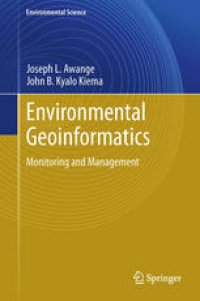
Ebook: Environmental Geoinformatics: Monitoring and Management
- Tags: Environmental Science and Engineering, Environmental Monitoring/Analysis, Remote Sensing/Photogrammetry
- Series: Environmental Science and Engineering
- Year: 2013
- Publisher: Springer-Verlag Berlin Heidelberg
- Edition: 1
- Language: English
- pdf
There is no doubt that today, perhaps more than ever before, humanity faces a myriad of complex and demanding challenges. These include natural resource depletion and environmental degradation, food and water insecurity, energy shortages, diminishing biodiversity, increasing losses from natural disasters, and climate change with its associated potentially devastating consequences, such as rising sea levels.
These human-induced and natural impacts on the environment need to be well understood in order to develop informed policies, decisions, and remedial measures to mitigate current and future negative impacts. To achieve this, continuous monitoring and management of the environment to acquire data that can be soundly and rigorously analyzed to provide information about its current state and changing patterns, and thereby allow predictions of possible future impacts, are essential. Developing pragmatic and sustainable solutions to address these and many other similar challenges requires the use of geodata and the application of geoinformatics.
This book presents the concepts and applications of geoinformatics, a multidisciplinary field that has at its core different technologies that support the acquisition, analysis and visualization of geodata for environmental monitoring and management. We depart from the 4D to the 5D data paradigm, which defines geodata accurately, consistently, rapidly and completely, in order to be useful without any restrictions in space, time or scale to represent a truly global dimension of the digital Earth. The book also features the state-of-the-art discussion of Web-GIS.
The concepts and applications of geoinformatics presented in this book will be of benefit to decision-makers across a wide range of fields, including those at environmental agencies, in the emergency services, public health and epidemiology, crime mapping, environmental management agencies, tourist industry, market analysis and e-commerce, or mineral exploration, among many others.
The title and subtitle of this textbook convey a distinct message. Monitoring -the passive part in the subtitle - refers to observation and data acquisition, whereas management - the active component - stands for operation and performance. The topic is our environment, which is intimately related to geoinformatics. The overall message is: all the mentioned elements do interact and must not be separated. Hans-Peter B ahr, Prof. Dr.-Ing. Dr.h.c., Karlsruhe Institute of Technology (KIT), Germany.
There is no doubt that today, perhaps more than ever before, humanity faces a myriad of complex and demanding challenges. These include natural resource depletion and environmental degradation, food and water insecurity, energy shortages, diminishing biodiversity, increasing losses from natural disasters, and climate change with its associated potentially devastating consequences, such as rising sea levels.
These human-induced and natural impacts on the environment need to be well understood in order to develop informed policies, decisions, and remedial measures to mitigate current and future negative impacts. To achieve this, continuous monitoring and management of the environment to acquire data that can be soundly and rigorously analyzed to provide information about its current state and changing patterns, and thereby allow predictions of possible future impacts, are essential. Developing pragmatic and sustainable solutions to address these and many other similar challenges requires the use of geodata and the application of geoinformatics.
This book presents the concepts and applications of geoinformatics, a multidisciplinary field that has at its core different technologies that support the acquisition, analysis and visualization of geodata for environmental monitoring and management. We depart from the 4D to the 5D data paradigm, which defines geodata accurately, consistently, rapidly and completely, in order to be useful without any restrictions in space, time or scale to represent a truly global dimension of the digital Earth. The book also features the state-of-the-art discussion of Web-GIS.
The concepts and applications of geoinformatics presented in this book will be of benefit to decision-makers across a wide range of fields, including those at environmental agencies, in the emergency services, public health and epidemiology, crime mapping, environmental management agencies, tourist industry, market analysis and e-commerce, or mineral exploration, among many others.
The title and subtitle of this textbook convey a distinct message. Monitoring -the passive part in the subtitle - refers to observation and data acquisition, whereas management - the active component - stands for operation and performance. The topic is our environment, which is intimately related to geoinformatics. The overall message is: all the mentioned elements do interact and must not be separated. Hans-Peter B ahr, Prof. Dr.-Ing. Dr.h.c., Karlsruhe Institute of Technology (KIT), Germany.